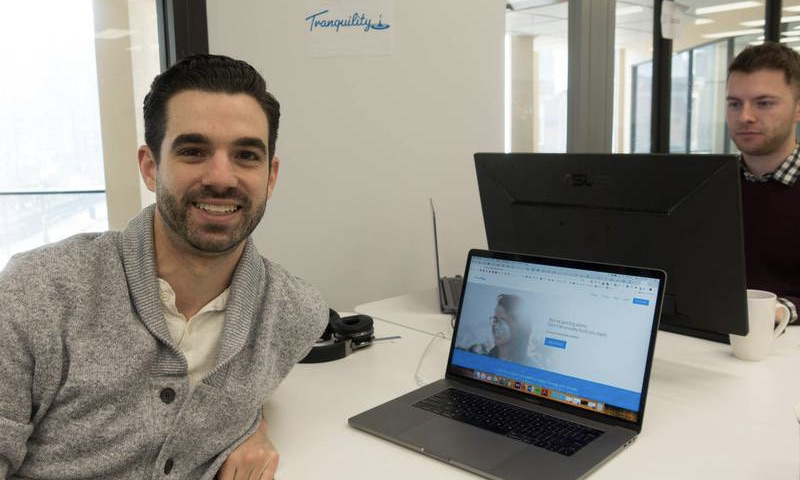A year and a half after its sale to Green Shield Canada, Halifax-based virtual therapy specialist Tranquility Online is helping to anchor an expansion push into Atlantic Canada by the health insurance giant.
Joel Muise, who co-founded Tranquility and is now running the platform for Green Shield, said in an interview that the acquisition has allowed his business to grow far faster than it could have as an independent startup.
Before the Green Shield buyout, about 300 people had completed Tranquility’s automated cognitive behavioural therapy program, or CBT, a form of psychotherapy designed to cultivate self-awareness and short-circuit harmful patterns of thought. Now, just one initiative to attract more female users to the platform has resulted in more than 7,000 new signups.
“(Green Shield) have been in business for over 60 years, so they have a really good brand recognition,” said Muise. “They have so many more connections, especially outside of Atlantic Canada, that have obviously helped us grow by selling our product to other organizations outside the region.”
An employee assistance program refers to short-term counselling services provided by businesses to their staff.
Muise and co-founder Alissa Pencer, a Dalhousie University psychologist and neuroscientist, sold Tranquility to Green Shield in August of 2021, capitalizing on several competitors going public in a spate of listings that galvanized a sentiment already held by many insurance companies: that the virtual therapy industry was maturing, leaving less room for new players.
Many health insurers wanted their own virtual therapy platforms to offer clients, Muise said in February, and with the market crowded, they were left searching for existing businesses to acquire.
In the case of Green Shield, that meant merging Tranquility with another virtual therapy startup the insurer had recently purchased, Toronto’s Inkblot Therapy. Muise, who continues to run Tranquility’s operations, now holds the title of Senior Director of iCBT at Inkblot. The “i” denotes that the CBT is internet-based.
Since the buyout, Muise said Green Shield has been using Tranquility as a vehicle for a broader move into the Atlantic Provinces. Meanwhile, having access to the resources, brand recognition, and crucially, the existing customer base of an established organization, has let Tranquility rapidly increase its rate of scaling.
All 4 million of Green Shield’s customers have access to Tranquility as part of their insurance plans.
“It’s kind of interesting because most of the things that I had to do in my old role have now been taken on by several other people,” said Muise, who said previously he pursued the Green Shield buyout in part because he disliked being the sole person responsible for managing day-to-day operations.
“The amount of support and leadership that is involved in the product now versus before selling is really huge for us.”
Much of Tranquility’s growth has also come in the form of expanded dealings with Nova Scotia Health.
The parties first inked a deal to make the platform available to Nova Scotians in March, with about 150 people having since used it, but patients previously had to be referred either by their primary care physician or the government’s Mental Health and Addictions Intake Program, making it difficult to access for some.
Last week, Tranquility and the province announced they had expanded their agreement to include anyone with a Nova Scotia health card — possibly in deference to the fact that there are now more than 115,000 people without a family doctor in a province of barely 1 million.
The initiative that led to the roughly 7,000 new signups is dubbed Room for Her, which offers women a year of free iCBT in response to evidence suggesting COVID-19 has disproportionately harmed them as a demographic. Last year, a report from RBC Economics found that 100,000 women had left the workforce since the beginning of the pandemic, which is about 10 times the figure for men.
Muise said it is difficult to pinpoint exactly how many people are working on Tranquility because his team shares resources with the rest of Inkblot, but the company as a whole recently reached the 100-employee mark and is “hiring people every week.”










